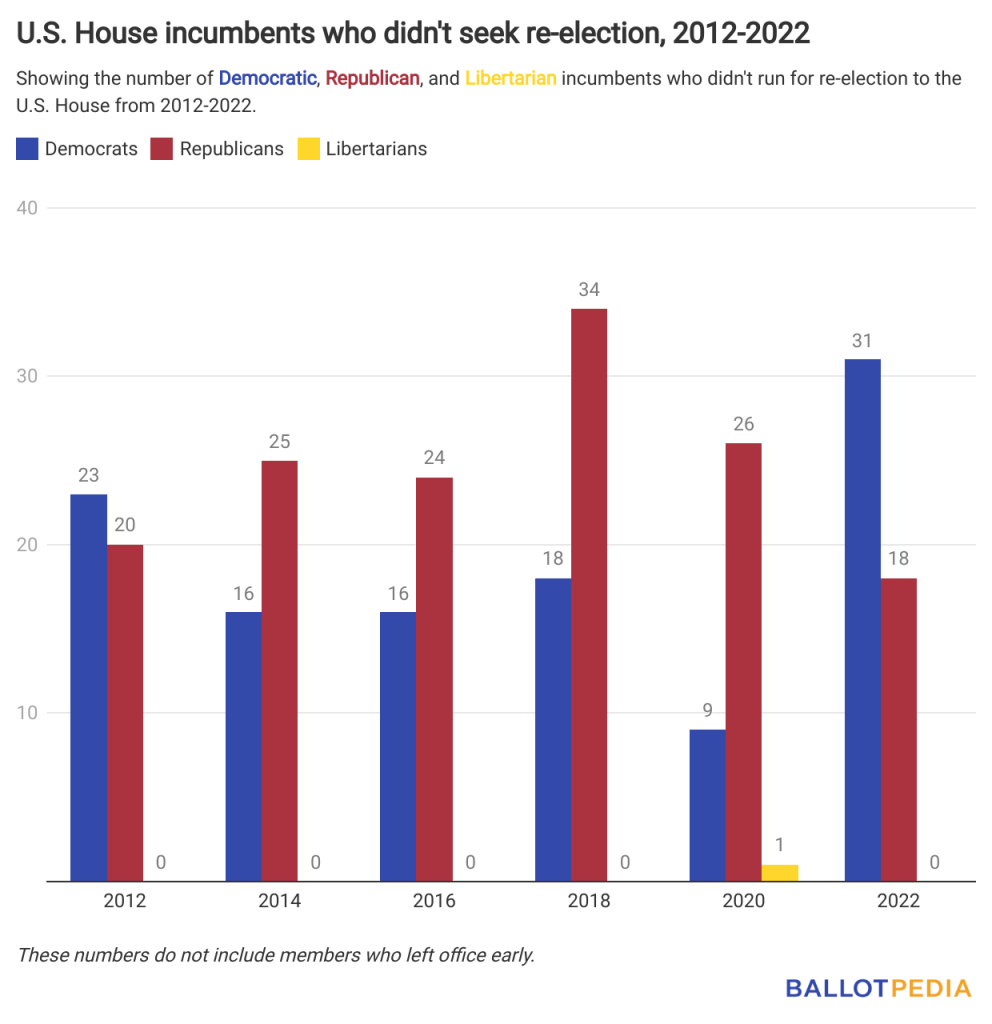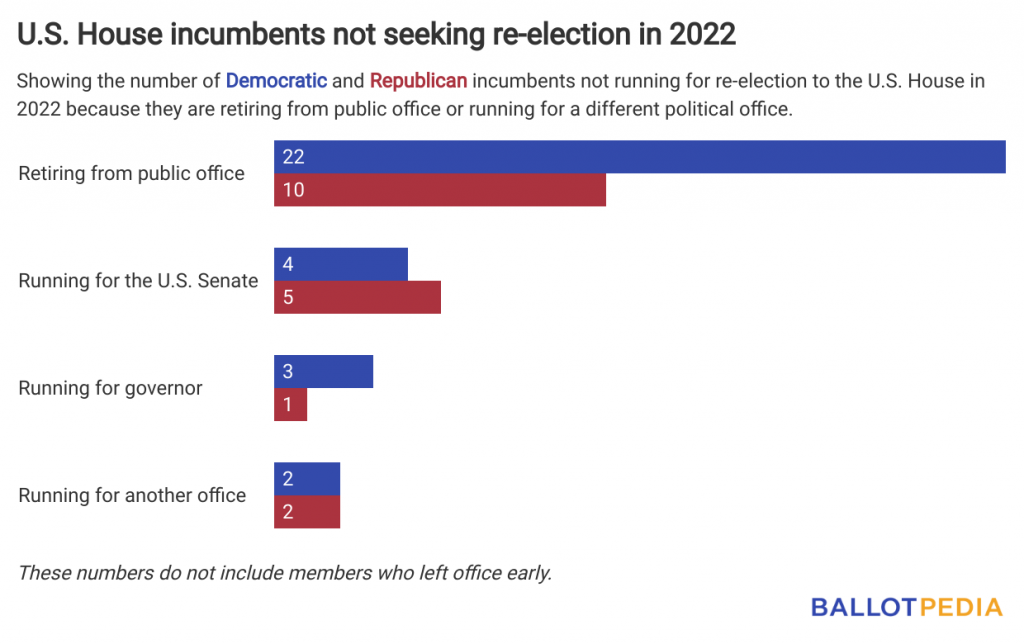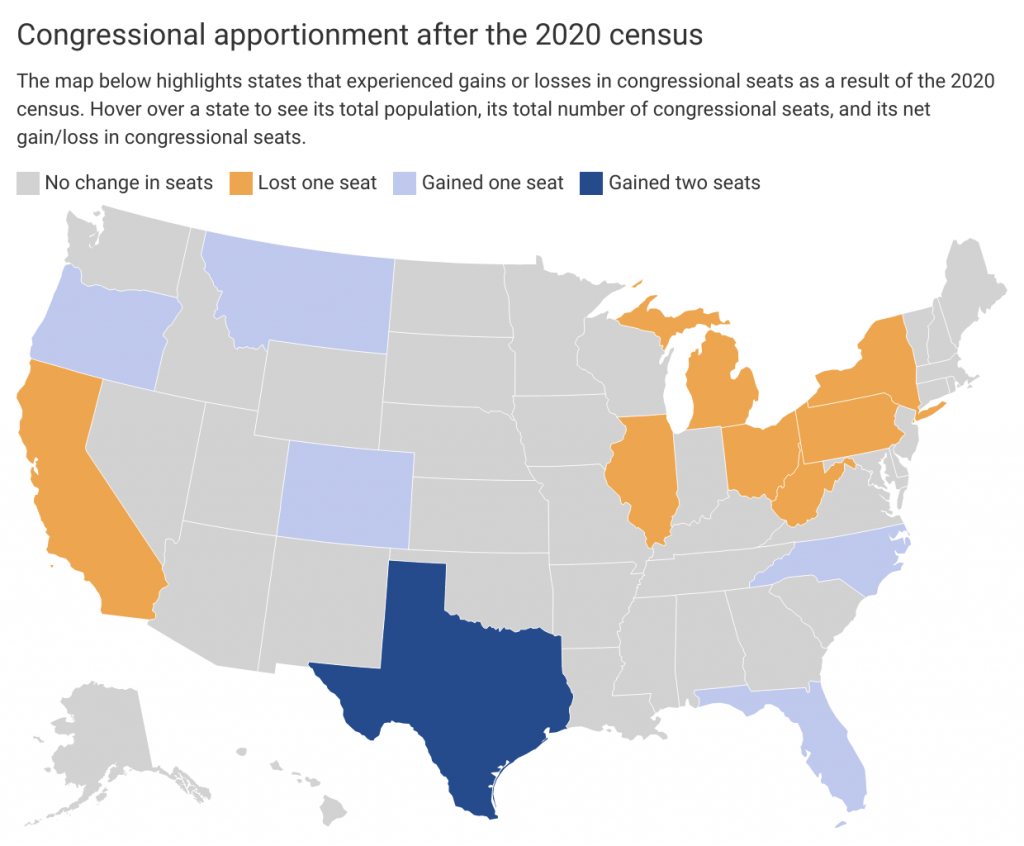Elections to the United States House of Representatives will take place on November 8, 2022. The seats of all 435 representatives are up for election this year, along with the seats of five of the six non-voting members of the U.S. House.
Democrats maintained their majority in the in the 2020 elections, winning 222 seats to Republicans’ 213. As of July 6, Democrats hold a 220-210 majority with five vacant seats. Republicans need to gain a net of eight seats to win a majority in the chamber.
There are 53 open U.S. House seats in states where the filing deadline has passed.
Forty-nine representatives—31 Democrats and 18 Republicans—are not seeking re-election to their U.S. House seats (not including those who left office early). Thirty-six members did not seek re-election in 2020.
The total number of incumbents not running for re-election is the second-highest this decade. The highest was in 2018, when 52 incumbents didn’t seek re-election. The number of Democratic incumbents not running for re-election this year is a decade-high.

Of the members not seeking re-election:
- Thirty-two—22 Democrats and 10 Republicans—are retiring from public office.
- Nine—four Democrats and five Republicans—are running for the U.S. Senate.
- Four—three Democrats and one Republican—are running for governor.
- Four—two Democrats and two Republicans—are running for another office.

As of July 6, 2022, 37 districts are rated as Toss-ups by the Cook Political Report, Inside Elections, Sabato’s Crystal Ball. Democrats hold 27 of those seats, Republicans hold eight, and two seats are vacant.
The 2022 election will be the first to take place following apportionment and redistricting after the 2020 census. Seven states (California, Illinois, Michigan, New York, Ohio, Pennsylvania, and West Virginia) lost one seat each. Five states (Colorado, Florida, Montana, North Carolina, and Oregon) gained one seat each, and Texas gained two seats.
The newly-created seats are:
- Colorado’s 8th Congressional District
- Florida’s 28th Congressional District
- Montana’s 2nd Congressional District
- Oregon’s 6th Congressional District
- Texas’ 37th Congressional District
- Texas’ 38th Congressional District

As a result of redistricting, there are eight districts where two incumbents filed to run against each other. In six of those, two incumbents from the same party filed to run against each other in their party primary:
- West Virginia’s 2nd District — Rep. David McKinley (R), the incumbent in the 1st district, and Rep. Alex Mooney (R), the incumbent in the 2nd district, ran in the Republican primary on May 10, 2022. Mooney defeated McKinley.
- Georgia’s 7th District — Rep. Lucy McBath (D), the incumbent in the 6th district, and Rep. Carolyn Bourdeaux (D), the incumbent in the 7th, ran in the Democratic primary on May 24. McBath defeated Bourdeaux.
- Illinois’ 6th District — Rep. Marie Newman (D), the incumbent in the 3rd district, and Rep. Sean Casten (D), the incumbent in the 6th, ran in the Democratic primary on June 28. Casten defeated Newman.
- Illinois’ 15th District — Rep. Rodney Davis (R), the incumbent in the 13th district, and Rep. Mary Miller (R), the incumbent in the 15th, ran in the Republican primary on June 28. Miller defeated Davis.
- Michigan’s 11th District — Rep. Andy Levin (D), the incumbent in the 9th district, and Rep. Haley Stevens (D), the incumbent in the 11th, are running in the Democratic primary set to take place on August 2.
- New York’s 12th District — Rep. Jerry Nadler, the incumbent in the 10th district, and Rep. Carolyn Maloney (D), the incumbent in the 12th, are running in the Democratic primary set to take place on August 23.
In the other two districts, incumbents from different parties are running against each other in the general election in November:
- Florida’s 2nd District — Rep. Al Lawson (D), the incumbent in the 5th district, and Rep. Neal Dunn (R), the incumbent in the 2nd, are both running.
- Texas’ 34th District — Rep. Vicente Gonzalez Jr. (D), the incumbent in the 15th district, and Rep. Mayra Flores (R), the incumbent in the 34th, are running against each other in the general election. Flores won a special election to replace Rep. Filemon Vela (D) on June 14 and was sworn in on June 21.
Nine incumbents — three Democrats and six Republicans — have lost in primaries so far this year:
- Carolyn Bourdeaux (D) — Georgia’s 7th
- Marie Newman (D) — Illinois’ 6th
- Rodney Davis (R) — Illinois’ 15th
- Steven Palazzo (R) — Mississippi’s 4th
- Madison Cawthorn (R) — North Carolina’s 11th
- Bob Gibbs (R) — Ohio’s 7th
- Kurt Schrader (D) — Oregon’s 5th
- Tom Rice (R) — South Carolina’s 7th
- David McKinley (R) — West Virginia’s 2nd
The nine incumbents who have been defeated in primaries so far this year are already more than the eight incumbents who lost in primary elections in 2020.


